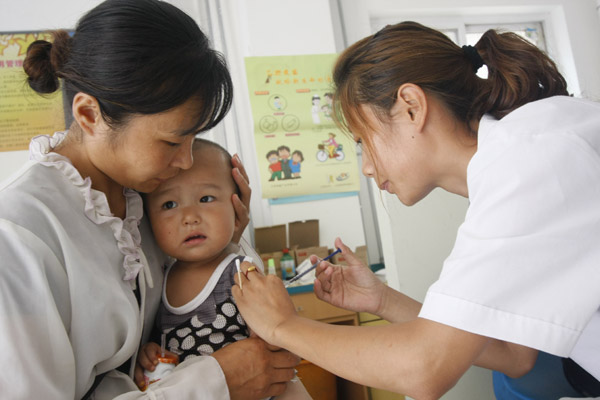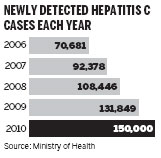|
 
- 现金
- 62111 元
- 精华
- 26
- 帖子
- 30437
- 注册时间
- 2009-10-5
- 最后登录
- 2022-12-28

|
Beijing - The Ministry of Health vowed to further strengthen its supervision and regulation of hospitals to reduce the chances that they will be places where patients regularly contract hepatitis C, a disease that has been becoming more common in China in recent years.

| A nurse gives a child a Hepatitis vaccine injection in a clinic in Yanggu county of Shandong province on Thursday, which was World Hepatitis Day. [Photo/China Daily] |
Lei Zhenglong, deputy director of the ministry's disease prevention and control bureau, made remarks to that effect on Thursday at an event marking World Hepatitis Day, which falls on July 28 every year.
"We're concerned about hepatitis C transmissions that stem from medical procedures such as blood transfusions, organ transplants and kidney dialysis," Lei told China Daily. "To protect the public from infections, we will hold regular field examinations at health institutions and make other improvements along the same lines."
In the past few years, diagnoses of hepatitis C have increased greatly in number on the mainland, official statistics showed. In 2010, about 150,000 confirmed cases of the virus occurred in China, nearly twice the number that had in 2006.
Among those who are most vulnerable to it are patients who receive blood transfusions or who are on long-term dialysis, drug addicts who regularly use hypodermic needles and the sexually promiscuous, experts said.

At least 60 percent of AIDS patients on the mainland have also been infected by hepatitis C. Meanwhile among dialysis patients, the prevalence of the virus stands at about 30 percent, said Zhuang Hui, an academician with the Chinese Academy of Engineering, citing regional studies.
In response, health authorities began testing donated blood in 1993 for the presence of hepatitis C, regulating dialysis practices at hospitals and taking similar steps.
"Those efforts have paid off since the number of transmissions that have occurred through these means has constantly declined over the years," Zhuang said.
Before 1993, most hepatitis C sufferers had contracted the disease from blood transfusions.
Ground, though, has been lost in the fight against the disease as the population has taken more to injecting drugs, having promiscuous sex and getting tattoos, Zhuang said.
Jia Jidong, who leads the liver-research center at the Beijing Friendship Hospital, encouraged those who are suffering from hepatitis C to go to a hospital. The disease, he said, can be cured so long as a patient is treated for it soon enough.
"Clinical doctors should also be trained to better detect and treat hepatitis C," he said, adding that most people who are infected by it show no symptoms.
Those who do exhibit signs of the disease most often complain of fatigue, a loss of appetite, nausea and stomach pains, experts said.
Since there is no way to inoculate someone against the virus, it is extremely important that people avoid contracting it in the first place, Jia said.
"A healthy way of living that eschews illegal drug use and unsafe sex is important for prevention," Zhuang said.
There are now at least 10 million hepatitis C patients on the mainland.
Since HIV and hepatitis C can be transmitted in many of the same ways and are both likely to infect members of the same groups, the Chinese government is trying to incorporate its work to slow the spread of hepatitis C into its work to combat HIV.
|
|